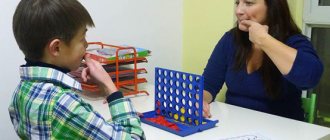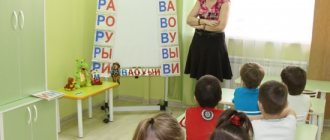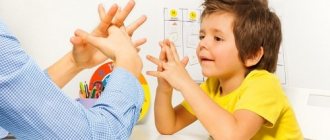Speech is of great importance for children, as it helps to develop logical thinking, memory, reading, writing, and general outlook. If there are speech defects, children's intellectual abilities decrease and difficulties with learning and adaptation appear. Speech therapy work helps to promptly prevent the development of speech function defects at an early stage of a child’s development, as well as correct incorrect speech. The sooner classes with a speech therapist or speech pathologist begin, the faster the violations are eliminated.
Why is a speech therapist needed?
Why do you need a speech therapist? A speech therapist is a specialist who helps to formulate speech correctly and diagnoses the state of speech function. To determine defects, he conducts the necessary tests - this process is called a speech therapy examination.
After the examination, the specialist draws up a speech therapy report, where he writes about the presence or absence of speech dysfunction. The card records sounds that are poorly pronounced by the child, omissions of letters, their replacement, rearrangement, and the presence of violations of speech tempo (fast, slow, stuttering). If the patient has pathologies, the speech therapist will refer you to specialized specialists. Often, a child with speech changes requires consultation with doctors: a neurologist, psychologist, otolaryngologist. If there are brain diseases or other pathologies that impair speech function, the patient takes a course of medications, after which corrective classes are carried out.
After drawing up a speech therapy report, the specialist prescribes a lesson plan. They can be carried out in the office of a speech therapist-teacher, kindergarten, or at home. Sometimes a small patient with severe deviations is sent to special kindergartens that correct speech. A speech therapist can work individually or conduct lessons with a group of children. Group lessons have an advantage over individual ones, as they provide the opportunity to teach a preschooler to hear other children’s pronunciation errors, allow them to pronounce sounds, and form words and sentences properly.
A speech therapist at a preschool institution (preschool) shapes the sound pronunciation of pupils. A speech therapy specialist trains teachers in the correct correction of speech disorders, organizes classes, games, and events with a speech therapy focus. The well-coordinated work of staff under the guidance of a speech therapist makes it possible to improve the quality of speech and eliminate existing defects in kindergarten students.
When are speech therapy services needed?
Speech therapy services may be needed if there are noticeable speech impediments relative to the child's age. Experts say that for timely diagnosis of disorders, even a healthy preschooler should be shown to a defectologist once a year. This will prevent developmental delays.
Speech therapist for babies up to 12 months
Speech therapy services may be needed for a baby under 12 months of age when his speech manifestations are not age-appropriate. You should go to a consultation if he doesn’t talk and doesn’t say simple words: mom, dad, grandma. When a young patient does not have humming or babbling, he should be assessed for hearing loss. For this, the patient is referred to an ENT doctor. If you have hyperactivity syndrome and other neurological diseases, it is recommended to visit a neurologist. After a complete examination, the defectologist conducts a speech therapy examination and draws up a treatment plan. With timely contact with a specialist before 1 year of age, the problem with speech development disorders is quickly eliminated.
Speech therapy assistance for a 2-year-old child
A speech therapist may be needed for a 2-year-old child if he or she has a very limited vocabulary: less than 10 words. Help is needed if phrasal expressions are missing. You should definitely show your baby to a specialist if there is no speech function.
The teacher will conduct an examination and refer you to specialists to identify possible causes of impaired sound reproduction. Defects in speech function in 2-year-old children are eliminated quite quickly, especially if they are not very pronounced. The nervous system of 2-year-old preschool children is very flexible, so the defect responds well to therapy.
Speech therapist for 3-year-old children
Three years of age is the diagnostic period for examining sound pronunciation. A 3-year-old child is actively developing and already has a large vocabulary (from 180-350 words and even up to 450-500). Even if there are no violations, parents must bring the little patient to a speech pathologist for examination.
The help of a speech therapist is necessary for a 3-year-old child with:
- replacing one sound unit with another (“T” is replaced by “K”);
- the baby talking in his own incomprehensible language;
- lack of speech function;
- poor speech in comparison with peers.
Such disorders cannot be ignored, since further developmental delay prevents the patient from living and learning normally.
Corrective classes for a 4-year-old preschooler
If a 4-year-old patient has not yet visited a speech therapist, then even if there are no problems with sound pronunciation, it is necessary to come to an appointment. This will allow you to identify minor deviations (if any) and correct them in a timely manner. It is especially important to consult a specialist if you have pathologies of speech development.
When is the time to go for a consultation:
- The conversation is indistinct, words are pronounced unclearly, blurred.
- The patient is more silent, although he can speak.
- A preschooler cannot reproduce more than 5 sound units correctly.
- There is no further development of speech (compared to last year).
- The baby is unable to carry on a conversation and does not answer the question.
Corrective assistance for a 5-year-old preschooler
A 5-year-old preschooler's speech is practically formed. A healthy patient does not require the help of a speech therapist, but one preventive visit per year is required. A consultation with a speech therapist-defectologist will be necessary for children with speech development disorders, especially for the production of the sounds “L” and “R”, which children of 5 years of age often cannot pronounce.
Possible pathologies requiring contact with a speech therapist:
- Sound reproduction is unclear.
- The preschooler pronounces sounds too softly or too firmly.
- Incorrect reproduction of more than 3 sound units.
- Nasal tone during conversation.
- The patient has a lisp.
- Poor vocabulary.
Speech therapists in kindergarten can help such a patient. Classes are conducted individually or with a group. It is allowed to transfer a preschooler from a regular group to a speech therapy group.
Correction for a 6-year-old child
A six-year-old patient is advised to visit a speech therapist once a year in the absence of speech deviations. If there is a pathology, speech therapy sessions are needed to correct the disorders. If necessary, the preschooler is also referred to specialists to identify the causes of developmental delay.
Indications for speech therapy correction:
- At least one sound is unclear.
- There are no detailed sentences in the patient's conversation.
- Monosyllabic answers to the question asked.
- Inability to compose a simple story based on the proposed images.
In a 6-year-old preschooler, even the most minor deviations from the norm cannot be ignored, since at the age of 7 the child needs to go to school, where oral correct speech skills will be required.
The need for speech therapy help at any age
Consultation and assistance from a speech therapist is necessary if the patient spoke well, but recently his speech has begun to deteriorate. Children with hesitations and repetitions of sounds also need correction. A preschooler who has difficulty remembering a poem in his or her own or a foreign language should be referred to a speech therapist.
Other reasons for contacting a speech therapy specialist:
- Inability to retell the story clearly.
- Skipping syllables while reading text.
- Clumsy, illegible handwriting.
- Deviations in speech appeared that were not there before (after hitting the head, severe stress).
- It became difficult to communicate with others.
Signs of normal speech development
The first reaction of a newborn baby is to cry. Afterwards it transforms into humming - the production of individual sounds. By six months, the baby is already babbling with might and main, that is, pronouncing similar syllables. He can already use them to express his demands and desires.
- The first stage of active speech begins at one year of age. By this time, the baby begins to pronounce individual words and connect them into simple sentences. The vocabulary increases; by the age of one and a half years, children begin to form phrases of four words.
- At 2-3 years old, the baby is already actively communicating with peers. His speech is far from ideal, he swallows parts of words and does not pronounce half of the sounds, but is able to remember simple poetry.
- At three years old, whistling sounds [С], [С'], [З], [З'], [Ц] appear, but they are not always pronounced clearly - this is normal.
- At the age of four, the hissing sounds [ZH], [SH], [CH'], [SH'] appear; children easily formulate their thoughts and conduct full-fledged dialogues with adults, which are limited only by their level of knowledge about the world around them.
- At five or six years old, the most complex sounds appear - sonorous sounds. These include [P], [P'], [L], [L']. Children are mastering speech better and better, and they almost no longer make mistakes. Their vocabulary contains about 2 thousand words.
- By the age of seven, the child pronounces all the sounds of the Russian language and pronounces them correctly. Actively retells stories using pictures, easily changes intonation and uses about 3,500 words in communication.
If your baby develops according to the scenario described above, then the child needs a speech therapist at 2.5 years old. The specialist will diagnose speech development, make sure that the baby is developing normally, and tell you the nuances of the current state of speech, what you should pay attention to.
Rules for visiting a speech therapist
The child should be taken to a speech therapist for the first time in the third year of life. If there are deviations in speech development before the age of 3, then consultation with a specialist will be required earlier. Preventive examinations of healthy children by a speech therapist should be carried out once a year. They are held from 3 to 7 years of age. It is better to bring a preschooler to a consultation immediately, so that if deviations are identified there is enough time to eliminate the defect, especially in children 5-7 years old.
Routine examinations by a speech therapist should not be ignored. They will help to promptly identify violations of sound pronunciation and prepare the child for school in time. If you apply late, the disorders may persist and complicate social adaptation.
During classes they use games, skits, poems, cards with pictures, letters, speech therapy massage and gymnastics. Group classes are actively practiced. The duration of work with a speech therapist is 15-20 minutes. It is important not only to study in the speech therapist’s office, but also to do homework. A speech therapist must work with parents and give advice on homeschooling.
Bilingual children (bilinguals)
Many children nowadays grow up learning two languages. Mixing vocabulary from two languages, making more grammatical errors and having a relatively small vocabulary in speech are all common behaviors in children in the early stages of learning two languages simultaneously.
However, deficiencies usually disappear over time on their own. These normal characteristics are sometimes mistaken by pediatricians for speech delays. So make sure your pediatrician knows that your bilingual child is learning two languages at once if you are referred to a speech-language pathologist.








